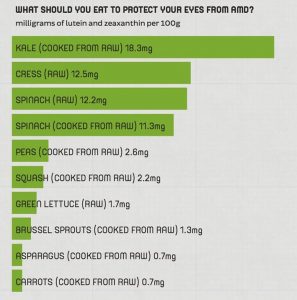
Your grandmother probably used the old wives’ tale that “carrots help you see in the dark” to make you eat your vegetables when you were younger.
Although carrots won’t quite give you the superpowers your grandmother suggested, there are some carrot components that really are good for your eyesight – but not in the way you may have thought. Crammed with beta-carotene, eating carrots helps our bodies produce vitamin A which is beneficial for a range of processes in our bodies, from supporting your immune system, to keeping your skin in great condition.
Vitamin A also plays a critical role in maintaining and protecting our vision. With up to 500,000 people every year losing their sight due to vitamin A deficiencies, getting enough of this good stuff is essential for your eyes.
But it’s not just vitamin A that is crucial for looking after your baby blues (or browns, greys or greens!). With a society that is increasingly aware of its health and fitness, there is a lot more we can do to look after our eyes through our diets. We may be living through a “health renaissance” but much of the #EatCleanTrainDirty mentality which has gained popularity in recent years is focused on how the body looks rather than how it functions. That makes paying attention to our internal processes and needs even more important and potentially beneficial.
In fact, consuming more of the right stuff could dramatically reduce your chance of developing vision problems like age-related macular degeneration (AMD) in later life. Consuming lots of lutein and zeaxanthin-rich foods could mean you are 40% less likely to develop AMD, according to a Harvard University study which followed 102,046 participants over 20 years.
Macular degeneration explained
We spend much of our modern lives staring at screens. From laptops and smartphones, to tablets and TVs, our eyes are subject to a lot of blue light from artificial sources. When we’re not looking at our screens, we’re often out and about – exposed to sunlight.
While getting a decent dose of sunshine is very good for us, over time the blue light from the sun and screens can damage our eyesight. That’s because this harmful UV light is filtered out, in order to protect our retina, by our macula.
But our light-filtering macula isn’t indestructible. A lifetime of exposure to blue light can break down this crucial part of our eye, leaving us with blurred, patchy vision, blind spots and blindness full stop. The condition is especially common amongst older people. One in ten individuals over 65 have AMD, while three in ten over 75s also have the condition.
Eating for your eyes
But you don’t have to become part of these statistics as you age. Harvard University’s study backed up evidence that shows that eating plenty of foods rich in lutein and zeaxanthin can support the natural levels of these substances found in the macula itself. It’s these nutrients which help to shield the macula from the harmful effects of blue light.
So how can you pack more lutein and zeaxanthin into your diet? The answer may be yummier and easier than you think. There are all sorts of foods that are naturally packed with these vision-supporting nutrients. Leafy greens are especially good – fantastic if you’re already a big fan of healthy eating.
If you want to include more lutein and zeaxanthin in your daily diet, try whizzing up a kale smoothie (the leafy green contains 18.3mg of lutein and zeaxanthin per 100g). A yummy green salad could also support your eyesight. Both cress (12.5mg) and spinach (12.2mg) are full of the good stuff. Not a big vegetable person? Eggs are also high in these nutrients and protein too! Great news for fitness fanatics.

Recent Posts
- Castor Oil For Better Hair Growth: Is It Myth Or Fact?
- Exploring the Differences Between Sermorelin, Ipamorelin, Ibutamoren, GHRP2, and GHRP6: Understanding Their Role in Human Growth Hormone Regulation
- Unraveling the Mystery: Understanding the Causes and Prognosis of Ventricular Tachycardia Without Apparent Heart Disease
- Understanding Grandparents’ Rights in Oklahoma: Navigating Visitation and Legal Protections
- 10 Reasons to Consider Hypnotherapy for Your Health

